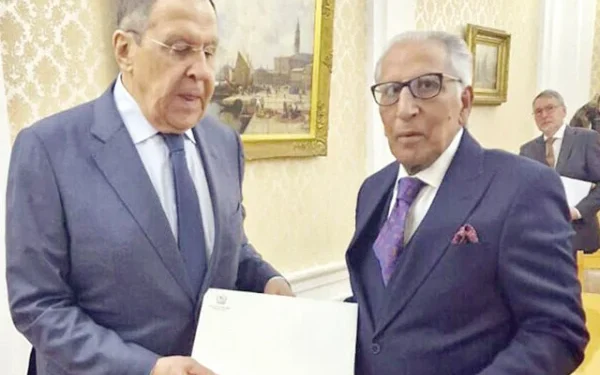Moscow, Russia – In a significant diplomatic engagement aimed at strengthening bilateral ties and addressing pressing regional concerns, Tariq Fatemi, the Special Assistant to the Prime Minister on Foreign Affairs, met with Russian Foreign Minister Sergei Lavrov in Moscow on Tuesday. The meeting marked the beginning of Fatemi’s high-level diplomatic visit to the Russian Federation, during which he also delivered an official letter from Prime Minister Shehbaz Sharif to President Vladimir Putin.
Pakistan-Russia Diplomatic Engagement Gains Momentum
This latest meeting is viewed as a pivotal moment in the ongoing evolution of Pakistan-Russia bilateral relations, particularly in the context of shifting global alliances and a rapidly changing geopolitical landscape. While historically the two nations maintained limited engagement during the Cold War era due to Pakistan’s alignment with the West, recent years have seen a marked thawing of relations, with cooperation steadily growing in areas such as energy, defense, trade, and regional connectivity.
The meeting between Tariq Fatemi and Lavrov reaffirmed this positive trajectory, with both sides expressing a strong desire to enhance strategic collaboration and economic interdependence.
Fatemi Conveys Pakistan’s Concerns Over Indian Aggression
A significant focus of the discussion was Pakistan’s security concerns, particularly in light of recent Indian actions perceived as hostile and provocative. Fatemi presented Pakistan’s official stance on India’s increasingly assertive policies in South Asia, especially relating to Kashmir, regional military build-up, and diplomatic pressure tactics.
One of the core issues raised was India’s controversial move to label the Indus Waters Treaty (IWT) as “suspended”—a step that Fatemi warned could have grave consequences for regional stability. He emphasized that any disruption of this World Bank-brokered treaty, signed in 1960, would set a dangerous precedent and pose serious risks to peace between nuclear-armed neighbors.
Fatemi sought Russia’s understanding and support in discouraging unilateralism in South Asia, highlighting Pakistan’s consistent calls for dialogue and peaceful resolution of disputes.
Delivering a Message from PM Shehbaz Sharif to President Putin
In a symbolic gesture underscoring the importance Pakistan attaches to its ties with Russia, Fatemi handed over a personal letter from Prime Minister Shehbaz Sharif addressed to Russian President Vladimir Putin.
While the contents of the letter were not publicly disclosed, diplomatic sources suggest it includes:
- A message of goodwill and friendship from the Pakistani leadership
- A call for strengthening bilateral cooperation in multiple strategic sectors
- Support for Russia’s expanded role in regional economic development
- A reaffirmation of Pakistan’s intention to remain neutral in global conflicts and continue to pursue independent foreign policy
The delivery of this letter highlights Islamabad’s efforts to build multi-vector foreign relations, especially as it faces pressure from both the Western bloc and emerging Eastern powers amid global power realignments.
Energy, Trade, and Connectivity: Focus of Pakistan-Russia Talks
Tariq Fatemi and Sergei Lavrov discussed expanding collaboration in key economic areas, including:
1. Energy Sector Cooperation
Russia is one of the world’s leading energy exporters, and Pakistan has shown increasing interest in diversifying its energy sources, especially in the aftermath of rising global fuel prices. Discussions reportedly included:
- Liquefied Natural Gas (LNG) imports from Russia
- Long-term energy deals to ensure Pakistan’s energy security
- Follow-up on the Pakistan Stream Gas Pipeline (PSGP) project, a major joint initiative aimed at improving Pakistan’s internal energy transmission infrastructure
2. Regional Connectivity Projects
Lavrov emphasized the importance of Eurasian connectivity initiatives, which align with Pakistan’s interest in becoming a regional trade hub through:
- Participation in the International North-South Transport Corridor (INSTC)
- Developing rail and road links that connect Russia, Central Asia, and South Asia
- Synergies with China’s Belt and Road Initiative (BRI) and the China-Pakistan Economic Corridor (CPEC)
3. Trade and Industrial Development
Lavrov highlighted Russia’s willingness to collaborate on industrial infrastructure, particularly suggesting the development of new steel mills in Pakistan. This would not only boost local employment and manufacturing capacity but also deepen Russia’s economic footprint in South Asia.
Russia Supports Normalization of Pakistan-India Relations
Addressing Pakistan’s concerns about rising tensions with India, Foreign Minister Lavrov assured Russia’s support for efforts to de-escalate and promote regional peace.
Russia has traditionally maintained close ties with India but has more recently sought to balance its South Asian outreach by building relations with Pakistan. Lavrov acknowledged the importance of regional stability and indicated Russia’s readiness to play a constructive diplomatic role in facilitating Pakistan-India normalization, provided both sides agree to such mediation.
His comments reflect Moscow’s interest in conflict resolution, especially to safeguard ongoing and future regional economic projects that could be disrupted by instability.
Broader Geopolitical Context: A Strategic Pivot
Fatemi’s visit and high-level meetings come at a time when Pakistan is recalibrating its foreign policy, especially in the wake of:
- Shifting global alliances following the Russia-Ukraine conflict
- Ongoing tensions with India and Afghanistan
- Rising energy demands and economic pressures at home
- The desire to deepen relations with non-traditional partners such as Russia and Central Asian states
The visit also signals Islamabad’s desire to play a more proactive role in regional diplomacy, tapping into Russia’s expanding influence in Central and South Asia.
Past Engagements and the Road Ahead
While Pakistan and Russia have held several bilateral meetings in the past, including military exchanges and economic forums, this visit by Tariq Fatemi reaffirms Islamabad’s intention to institutionalize these interactions through:
- Regular high-level dialogues
- Enhanced economic diplomacy
- Joint commissions and working groups on energy, security, and trade
- Deeper collaboration in education, technology, and agriculture
Conclusion: Building a Robust Pakistan-Russia Partnership
Tariq Fatemi’s meeting with Russian Foreign Minister Sergei Lavrov represents a strategic milestone in Pakistan’s foreign policy diversification efforts. By addressing critical regional issues, pushing for enhanced trade and energy cooperation, and delivering a message directly from the Pakistani prime minister to the Russian president, the visit lays the groundwork for a broader and deeper bilateral partnership.
As global alliances continue to evolve, Pakistan-Russia relations have the potential to become an important balancing force in South Asia—one that promotes economic interdependence, regional stability, and diplomatic pragmatism.

























